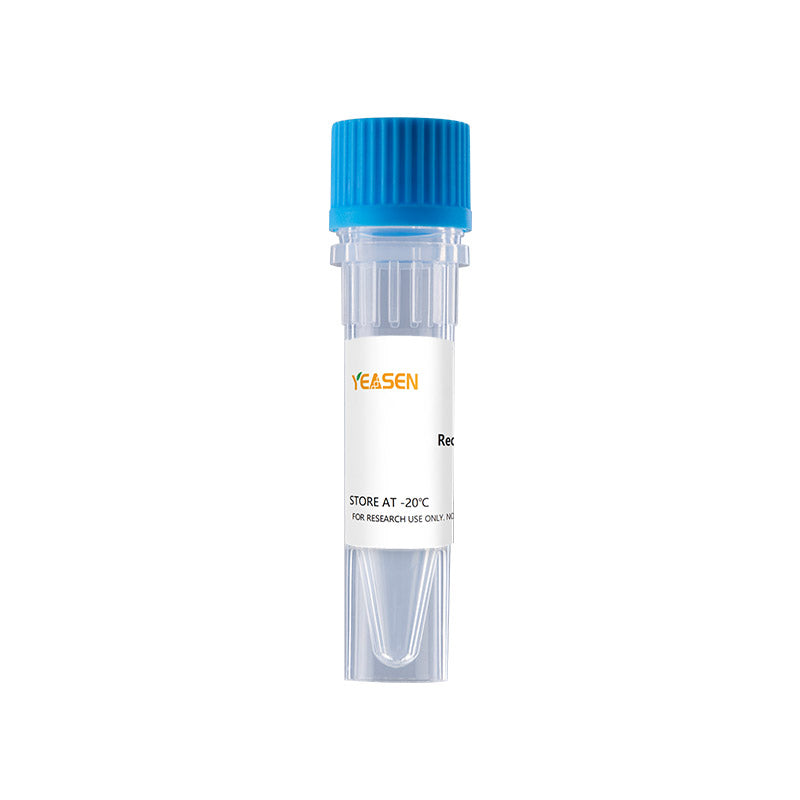Description
TNF-related apoptosis-inducing ligand (TRAIL), also called apoptosis 2 ligand (Apo2L) for its similarity in sequence, structure, and function to Fas Ligand/Apo1L, is a 33-35 kDa type II transmembrane glycoprotein of the tumor necrosis factor superfamily, designated TNFSF10. Mouse TRAIL cDNA encodes a 17 amino acid (aa) N-terminal intracellular domain, a 20 aa transmembrane domain and a 253 aa extracellular domain. Like most TNF family members, TRAIL is bioactive as a homotrimer. Unlike other TNF family members, a zinc ion complexed by human Cys 230 (mouse Cys 240) of each of the three monomers is critical for structural stability. Either transmembrane or cysteine protease-released soluble sTRAIL induce apoptosis of many transformed cell lines, but rarely of normal cells. Accordingly, TRAIL is suggested to have a role in tumor surveillance. Mice with genetically disrupted TRAIL have defective thymocyte apoptosis, creating faulty negative selection and some increased susceptibility to induced autoimmune diseases. In humans, TRAIL controls apoptosis of erythrocyte precursors and sTRAIL is inversely correlated with hemoglobin. TRAIL transcripts are constitutively expressed in a variety of human (and presumably mouse) tissues and mononuclear cells.
Product Properties
|
Synonyms |
CD253; Protein TRAIL; TL2 |
|
Accession |
P50592 |
|
GeneID |
22035 |
|
Source |
E.coli-derived Mouse TRAIL/TNFSF10, Pro118-Asn291. |
|
Molecular Weight |
Approximately 20.2 kDa. |
|
AA Sequence |
MPRGGRPQKV AAHITGITRR SNSALIPISK DGKTLGQKIE SWESSRKGHS FLNHVLFRNG ELVIEQEGLY YIYSQTYFRF QEAEDASKMV SKDKVRTKQL VQYIYKYTSY PDPIVLMKSA RNSCWSRDAE YGLYSIYQGG LFELKKNDRI FVSVTNEHLM DLDQEASFFG AFLIN |
|
Tag |
None |
|
Physical Appearance |
Sterile Filtered White lyophilized (freeze-dried) powder. |
|
Purity |
> 95 % by SDS-PAGE and HPLC analyses. |
|
Biological Activity |
The ED50 as determined by a cytotoxicity assay using murine L929 cells is less than 0.5 ng/mL, corresponding to a specific activity of > 2.0 × 106 IU/mg in the presence of actinomycin D. Fully biologically active when compared to standard. |
|
Endotoxin |
< 0.1 EU per 1μg of the protein by the LAL method. |
|
Formulation |
Lyophilized from a 0.2 µm filtered concentrated solution in PBS, pH 7.4, with 3 mM DTT. |
|
Reconstitution |
We recommend that this vial be briefly centrifuged prior to opening to bring the contents to the bottom. Reconstitute in sterile distilled water or aqueous buffer containing 0.1% BSA to a concentration of 0.1-1.0 mg/mL. Stock solutions should be apportioned into working aliquots and stored at ≤ -20℃. Further dilutions should be made in appropriate buffered solutions. |
Shipping and Storage
The products are shipped with ice pack and can be stored at -20℃ to -80℃ for 1 year.
Recommend to aliquot the protein into smaller quantities when first used and avoid repeated freeze-thaw cycles.
Cautions
1. Avoid repeated freeze-thaw cycles.
2. For your safety and health, please wear lab coats and disposable gloves for operation.
3. For research use only!
Payment & Security
Your payment information is processed securely. We do not store credit card details nor have access to your credit card information.
Inquiry
You may also like
FAQ
The product is for research purposes only and is not intended for therapeutic or diagnostic use in humans or animals. Products and content are protected by patents, trademarks, and copyrights owned by Yeasen Biotechnology. Trademark symbols indicate the country of origin, not necessarily registration in all regions.
Certain applications may require additional third-party intellectual property rights.
Yeasen is dedicated to ethical science, believing our research should address critical questions while ensuring safety and ethical standards.

